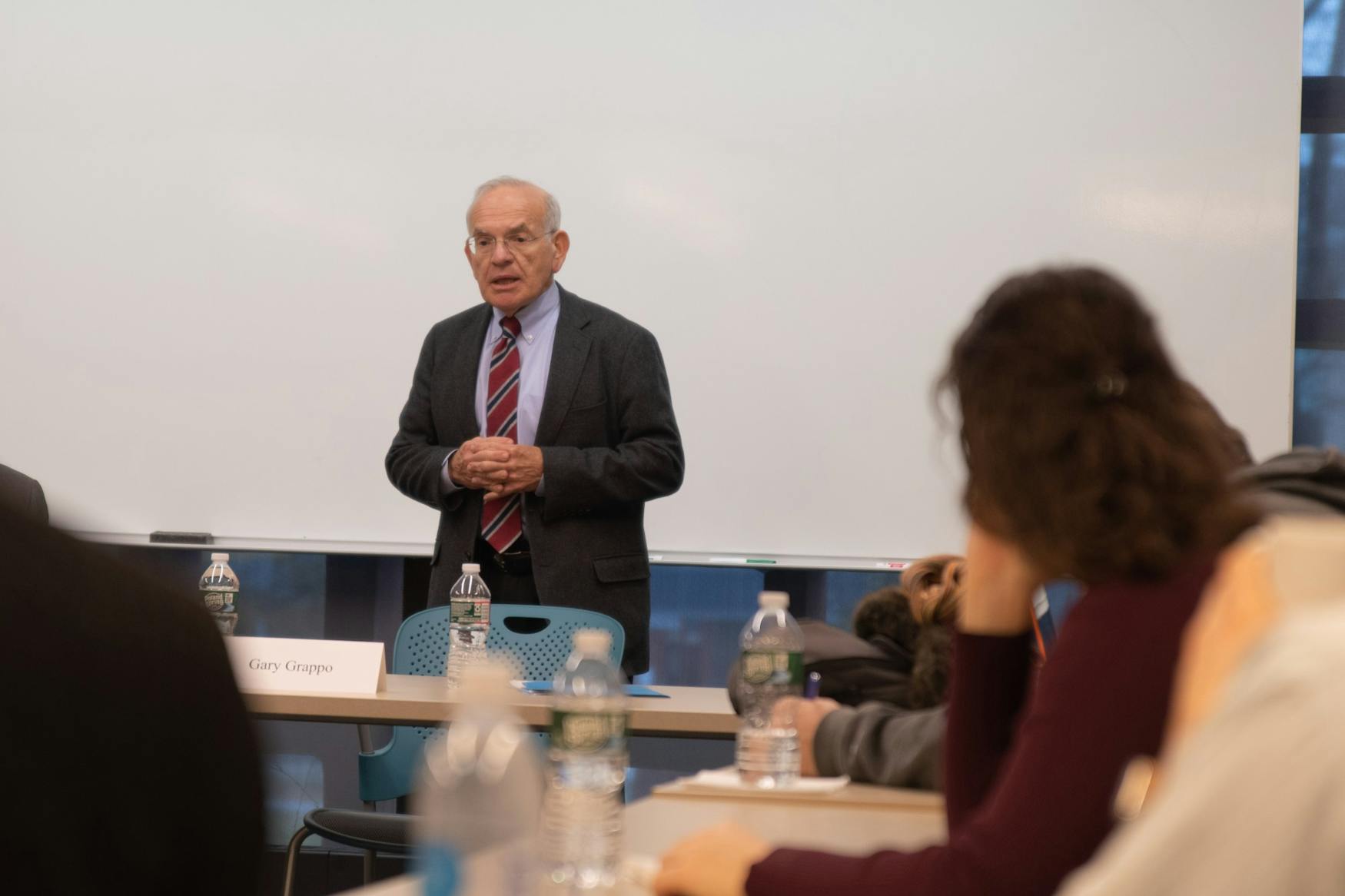Former diplomat delivers lecture on politics in Oman
Former U.S. Ambassador to Oman Gary Grappo talked about leadership, economics and politics in Oman.
The Crown Center for Middle East Studies on Wednesday hosted Gary Grappo, a former diplomat who served as United States Ambassador to Oman between 2006 and 2009. Grappo discussed Oman’s leader, Sultan Qaboos bin Said, who was instrumental in modernizing the country, and he analyzed current and upcoming challenges that Oman faces looking forward.
Grappo explained that Oman is ruled by the Al Said dynasty, which was established in the mid-18th century, making it one of the oldest surviving dynasties in the Middle East. Oman fell under British influence beginning in the 19th century, Grappo said. According to Grappo, the country particularly stagnated under the last Britain controlled Sultan: Said bin Taimur, who ruled from 1932 to 1970. Said’s rule ended in a bloodless coup instigated by his son Qaboos bin Said, after which Taimur spent his remaining days in London.
Qaboos was educated in a boarding school in Britain, according to Grappo. He then spent several years in the British military, serving in a North Atlantic Treaty Organization unit in Germany. Grappo explained that Qaboos’s father put him under house arrest because he feared the influence of Western thought on his son. Nevertheless, Qaboos continued his education and developed an extensive knowledge of Islam. According to Grappo, Qaboos overthrew his father because he agreed with the dissatisfaction surrounding Said’s rule, which had led to a rebellion in the region of Dhofar. Once Qaboos became Sultan, he was able to quell this rebellion by bringing a number of former rebels into his parliament, Grappo said.
Grappo emphasized Qaboos’s accomplishments. According to Grappo, Qaboos is responsible for Oman’s transition from a developing to a developed country, taking Oman from a per capita GDP of $320, one of the lowest in the world at the time, to around $24,000 today. He has also spent more on health and education than on the military. As a result, he has created a number of universities, and Oman now faces only the health problems of developed countries, such as Type II diabetes from an unhealthy Western diet.
With Oman’s diplomacy, Qaboos practices a policy of being a “friend of all [and an] enemy of none,” according to Grappo. Oman has a strong relationship with the United States but remains on good terms with all its neighbors in the Middle East including Iran, with which Oman frequently performs joint military exercises. According to Grappo, this policy has led to Oman serving as a useful intermediary between the U.S. and Iran during several past U.S. administrations. This policy also holds in the domestic sphere. Qaboos is careful to avoid sectarian violence. He keeps all places of worship open to everyone and, in 1993, sent away 100 teachers who were suspected to have been proselytizing Wahhabism, the ultraconservative Islamic sect common in Saudi Arabia.
Though Qaboos has been successful in making Oman a comfortable, well-off society, Grappo said that Oman faces several important challenges. One is an overreliance on oil and gas. Grappo explained that this reliance can especially be seen from Oman’s GDP peaking around the same time as world oil prices. According to Grappo, Oman had taken steps to counter this problem by turning back to its historical seafaring roots, namely by building major ports in the cities of Salalah and Dukam. There is also talk of an oil pipeline from Saudi Arabia to Dukam, which is projected to bring in high revenue, Grappo said.
A second outlet for replacing oil revenue, according to Grappo, is tourism. He expressed his support of this strategy, saying, “If you’re only going to visit one country in the Middle East, make it Oman,” but expressed doubt that this would be enough to fully replace declining oil revenues.
The second major challenge, that Grappo discussed, is the question of succession. Oman in its current state is essentially “tailormade” for Sultan Qaboos because “his hand is everywhere in that country,” Grappo said. He explained that Qaboos is not helping the transition process because he is becoming out-of-touch. Qaboos used to conduct a “meet-the-people” tour, where he would travel around the country and talk with Omani citizens about what they wanted from the government, but he discontinued this practice because of his long battle with colon cancer.
According to Grappo, the succession process for the Al Said dynasty is rather vague. Upon Qaboos’ death, the royal family will gather to choose a successor. If they are not able to decide on a successor within three days, they must consult a sealed envelope containing the person Qaboos finds fit to be his successor. According to Grappo, Qaboos’s second cousin, Sayyid Taimur, is the most likely candidate for his successor due to his friendly personality, government experience and close relationship with Qaboos.
To aid in a peaceful transition, Qaboos’ successor will have to take care to reassure both the parliament and the young Omani populace, a large percentage of whom are 25 years or younger. The successor will also have to decide how to handle the many roles Qaboos filled in Oman, including foreign minister, finance minister, head of the central bank and prime minister. Due to the immense amount of responsibility it puts on the new leader, Grappo argued that “delegation is going to be the order of the day,” which he hoped would lead to a more democratic Oman. One of Qaboos’ main shortcomings is his maintenance of authoritarianism, however subtle it may be, Grappo said. The parliament is “defanged” of any real influence, as one audience member concluded, and non-governmental organizations exist entirely based on government approval.
Grappo concluded his talk by emphasizing Qaboos’s popularity among the people of Oman. Unfortunately, he said, they are going to have to “confront the reality of not having an extraordinary human being running the country.”



Please note All comments are eligible for publication in The Justice.